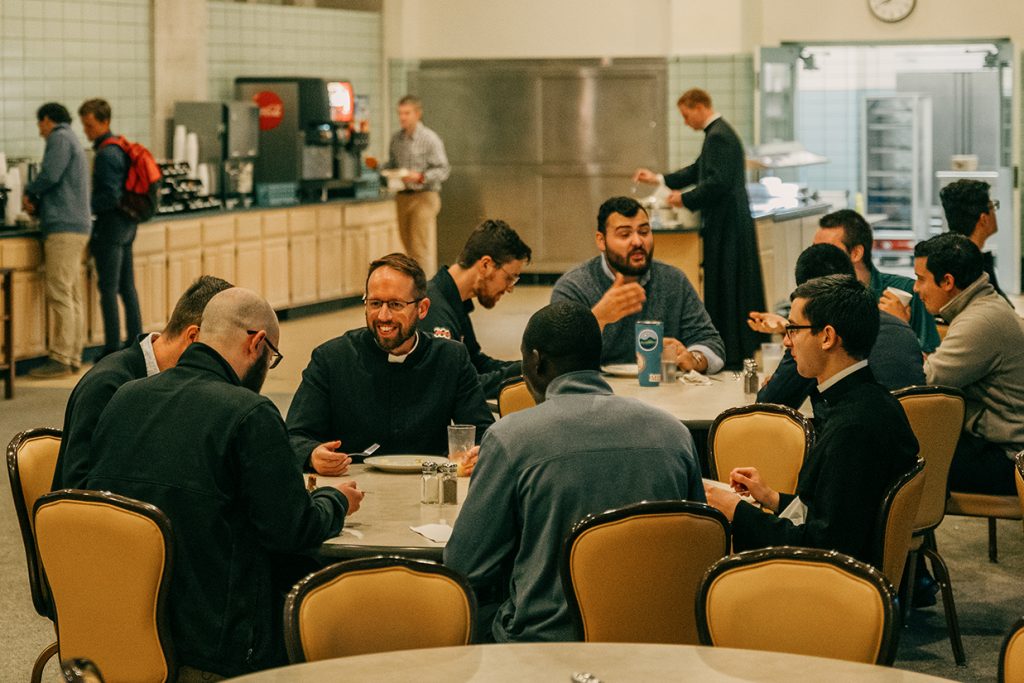Technology in Formation: Avoiding Negative Influences in the Digital Age

The story below was originally published in The Athenaeum, MTSM’s bi-annual magazine. The Athenaeum is published twice a year for alumni, patrons and friends of Mount St. Mary’s Seminary & School of Theology. To be added to the mailing list, contact: Heidi Walsh at 513.233.6159 or hwalsh@athenaeum.edu.
In Jesus’ High Priestly Prayer, He prays to the Father concerning his disciples, saying, “The world has hated them because they are not of the world, even as I am not of the world. I do not pray that you should take them out of the world, but that you should keep them from the evil one… As you have sent me into the world, so I have sent them into the world.” (Jn 17:14-15, 18). As Christians, we are called not to be of the world, but we are certainly sent into the world.
Occasionally, it seems that some believe priests and seminarians somehow fall from heaven without a past and free from the struggles that plague “everyone else.” The reality is that every priest and seminarian comes from the same cultural milieu that we all inhabit, with the same blessings and benefits but also with the same struggles and obstacles to be overcome. It is no mystery that we all live in a world saturated by technology, and today’s seminarians, mostly born in proximity to the year 2000, have lived their entire lives in a world of readily accessible internet, cell phones, video games and social media. Of course, the easy access to technology provides many benefits. Pope Francis, in his message for the World Day of Peace which centered on the use of artificial intelligence, affirmed the fact that technology can be used in such a way to “cooperate with [God’s] will to perfect creation and bring about peace among peoples.” So many of us can point to examples of podcasts or YouTube videos that have helped bring about conversions or have spurred us to grow in our faith and understanding. However, Pope Francis also cautioned that positive outcomes “will only be achieved if we show ourselves capable of acting responsibly” and if we respect “fundamental human values.”
The reality is that there is an ever-mounting body of evidence revealing that the misuse of technology is negatively impacting our ability to flourish as human beings, and men who are pursuing a call to the priesthood are not immune to these negative consequences. Studies show that the misuse of technology has led to reductions in sleep quality and quantity; decreased attention spans and ability to focus; an inability to maintain eye contact and anxiety when having face-to-face conversations; increased depression, loneliness and anxiety; and increased emotional dysregulation coupled with an inability to self-regulate.
These negative consequences of the misuse of technology sound daunting, and they are; however, there is cause for great hope. The men who engage the formation program at Mount St. Mary’s Seminary have shown themselves to be resilient, adaptable and eager to be formed into men who are fully human and ready to lead others to Christ who “fully reveals man to himself and makes his supreme calling clear” (GS 22). In the newly created Propaedeutic Stage, first-year seminarians undergo a prolonged technology fast in which they do not have access to their phones or social media, and have very limited access to the internet. The men who have undergone this fast have reported significant reversals in the negative effects of the misuse of technology detailed above. Furthermore, at every stage of formation, there are many opportunities for seminarians to grow as fully human men intellectually, spiritually, fraternally, and pastorally while free from the potentially negative impacts of technology. The seminarians have more than two hours daily in prayer; three daily communal meals; weekly “community nights” when everyone is together for some communal activity (trivia nights, athletics, lectures, etc.); monthly “work hours” when the men work on the grounds of the seminary (maintaining walking trails, removing honeysuckle, etc.); monthly one-on-one face-to-face meetings with both spiritual directors and formation advisors; frequent spiritual and formation conferences; weekly apostolic works (assisting at soup kitchens, pregnancy centers, grade schools, etc.); and this doesn’t even account for all of the extra work and services that the seminarians provide in their “free-time” (assisting with local youth groups, giving talks at parish functions, playing basketball games at local grade schools to promote vocations and much more). All of this is done in the absence of technology. Today’s seminarian already knows how to use technology, but the formation program at Mount St. Mary’s Seminary gives them the opportunity to flourish and to become more fully human, free from the negative impact of the misuse of technology
Those who work in seminary formation are privileged to witness the transformative journey of these men as they dedicate themselves to the Lord’s service. The formation program equips them to navigate the digital world, understanding its benefits while remaining detached from its negative influences. This preparation instills in them a deep sense of purpose and eagerness to lead others to Christ, the source of our freedom, joy, and peace.
Rev. Christopher Geiger, J.C.L., is Vice Rector of Mount St. Mary’s Seminary and Director of Formation, Rev. Daniel K. Hess, S.T.L., J.D., is Director of the Propaedeutic Stage and a member of the Formation Team